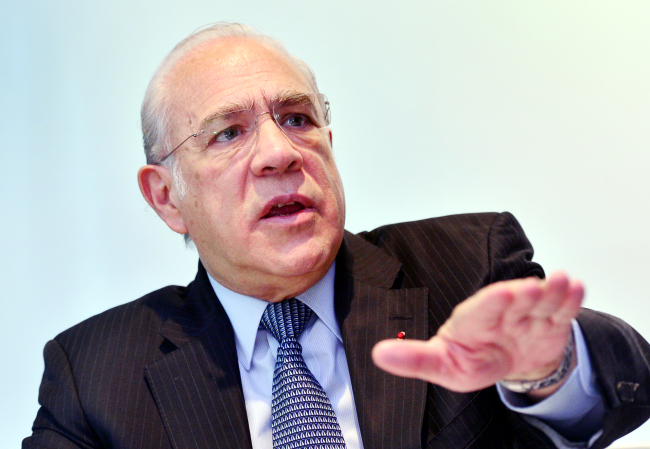[Herald Interview] S. Korea should ease up on growth pace, focus on reforms: OECD chief
Gurria calls Seoul to look beyond conventional economic indicators
By Bae HyunjungPublished : Nov. 27, 2018 - 12:25
Despite pessimistic projections for global growth and consequent market anxiety, South Korea’s economy is expected to put up a reasonably good fight in the coming years, according to the chief official of the Organization for Economic Cooperation and Development.
The primary concern for Asia’s fourth-largest economy, however, is whether it can expand beyond the conventional frame of economic measurements and use its capacities and potential to fundamentally improve people’s lives on a sustainable basis, the official pointed out.
“For the OECD, progress is about making people’s lives better so this means measurement indexes have to embrace all that matters to people, such as income, health, education, environment, and eventually happiness,” OECD Secretary-General Angel Gurria said Monday in an exclusive interview with The Korea Herald.
“Most changes taking place around the world today come with both opportunities and risks. What is good for the economy may not necessarily be good for people’s well-being, as is often the case may in advanced economies in which people do not picture themselves as happy.”
The primary concern for Asia’s fourth-largest economy, however, is whether it can expand beyond the conventional frame of economic measurements and use its capacities and potential to fundamentally improve people’s lives on a sustainable basis, the official pointed out.
“For the OECD, progress is about making people’s lives better so this means measurement indexes have to embrace all that matters to people, such as income, health, education, environment, and eventually happiness,” OECD Secretary-General Angel Gurria said Monday in an exclusive interview with The Korea Herald.
“Most changes taking place around the world today come with both opportunities and risks. What is good for the economy may not necessarily be good for people’s well-being, as is often the case may in advanced economies in which people do not picture themselves as happy.”

The top official’s visit to Seoul came as part of the sixth OECD World Forum, “The Future of Well-being,” taking place from Tuesday to Thursday this week in the western metropolitan city of Incheon.
“Technological innovation is a crucial element, one that keeps the world moving forward, but in our perspective, innovation fulfills its function when it actually advances the quality of people’s lives,” Gurria said.
For instance, innovation should lead to higher levels of well-being, such as more leisure time for individuals, better quality jobs, better health indicators and greater happiness, according to the OECD official.
“No one can deny (South Korea’s) relatively steady growth rate compared to economic peers, its tight labor market and balanced R&D investment portfolio,” he said.
The country’s total R&D investments -- almost double that of the OECD average -- also consist of a balanced mix of private and public investments, with the private sector accounting for two-thirds and the public sector for one-third, according to Gurria.
“These factors, in hand with the hard work and devotion (of the Korean people), put South Korea in a good position in terms of innovation and growth,” he said.
“But our essential role is not to compliment countries on their achievements but rather to remind them of the challenges ahead.”
OECD data earlier showed that South Korea’s economic trend is likely to deteriorate over the next six to nine months. The country’s Composite Leading Indicator stood at 99.2 for August, down 0.1 point from the previous month and remaining under the 100 mark for 17 straight months.
Combined with aggravating economic forecasts, the OECD’s projection was viewed by some as the bellwether of another prolonged financial downturn.
“Being a midsized open economy, South Korea is highly dependent on trade and thus vulnerable to uncertainties,” Gurria said.
“If certain conditions materialize, the impact will immediately increase. There is no fixed scenario.”
Adding to external variables, such as escalating trade tension between Washington and Beijing, South Korea’s domestic issues also influenced the growth pace.
In its Economic Outlook report published last week, the OECD set South Korea’s growth rate at 2.7 percent for this year, 2.8 percent for 2019 and 2.9 percent for 2020, forecasting an incremental acceleration in the mid-term.
“The cut down from the 3.1 percent growth rate observed in 2017 is largely due to the sluggish employment growth, which reflects the double-digit hike of the minimum wage and the overall restructuring of the manufacturing sector,” the official said.
Nonetheless, Seoul’s economic fundamentals remain strong, with the government budget in surplus and a debt level that is relatively low compared to the nation’s gross domestic product, he noted.
“Economic indicators should, of course, be taken seriously but South Korea should also understand that its figures are reasonably sound, especially compared to other OECD member states,” the secretary-general said.
What the country should prioritize, according to Gurria, is to move ahead with reforms in an effort to promote the notion of inclusive growth.
“Labor productivity and female employment could be an issue for Korea which faces the fastest population aging and displays the highest gender wage gap of 37 percent in the OECD.”
Initiatives related to inclusive growth are also part of the agenda of this year’s OECD World Forum during which participants are set to discuss how digitalization, governance and the role of the private sector can contribute to the well-being of people.
“Since launching the Better Life Initiative in 2011, we have made visible progress in measuring well-being,” Gurria said.
“We are now integrating well-being into our policy advice, meaning that we put on a well-being lens while approaching major policy issues.”
By Bae Hyun-jung (tellme@heraldcorp.com)



















![[Today’s K-pop] BTS pop-up event to come to Seoul](http://res.heraldm.com/phpwas/restmb_idxmake.php?idx=642&simg=/content/image/2024/04/17/20240417050734_0.jpg&u=)